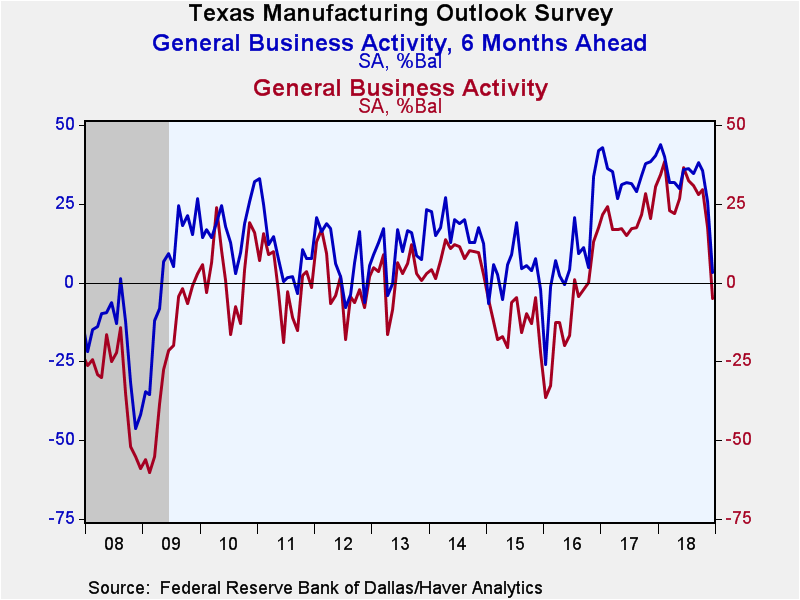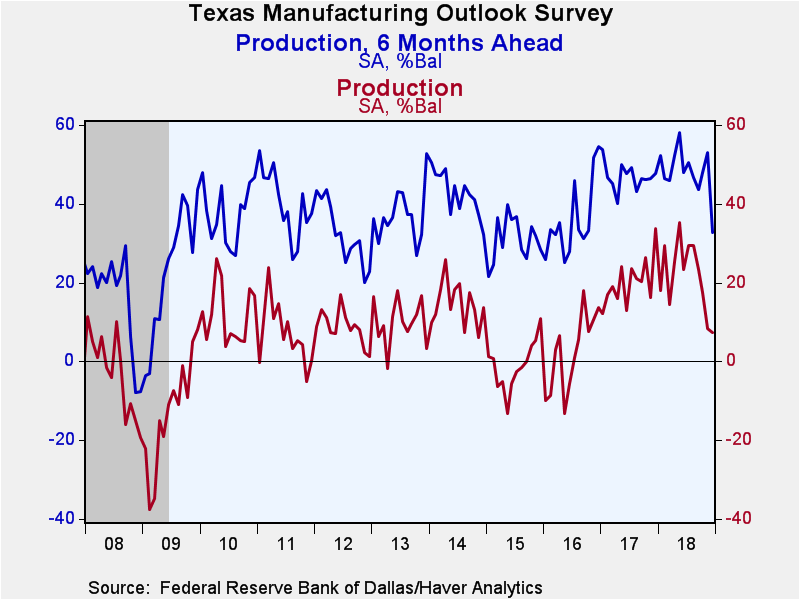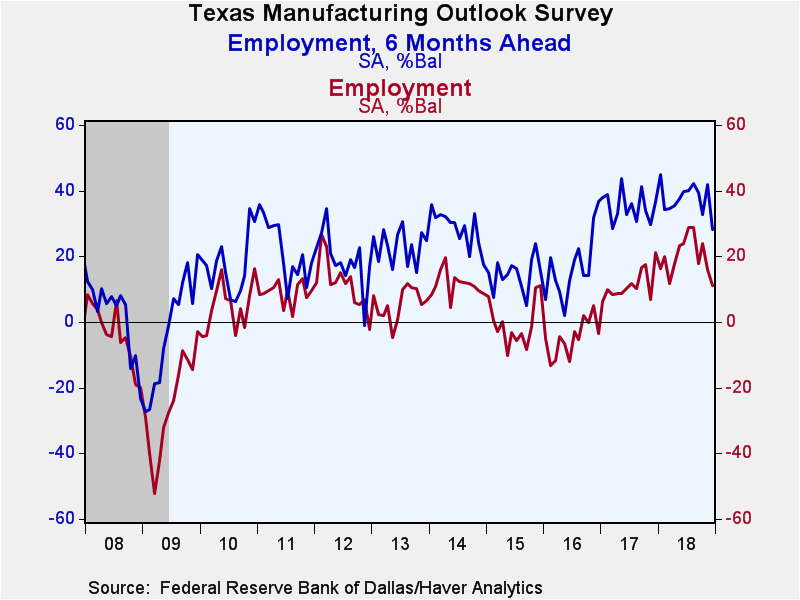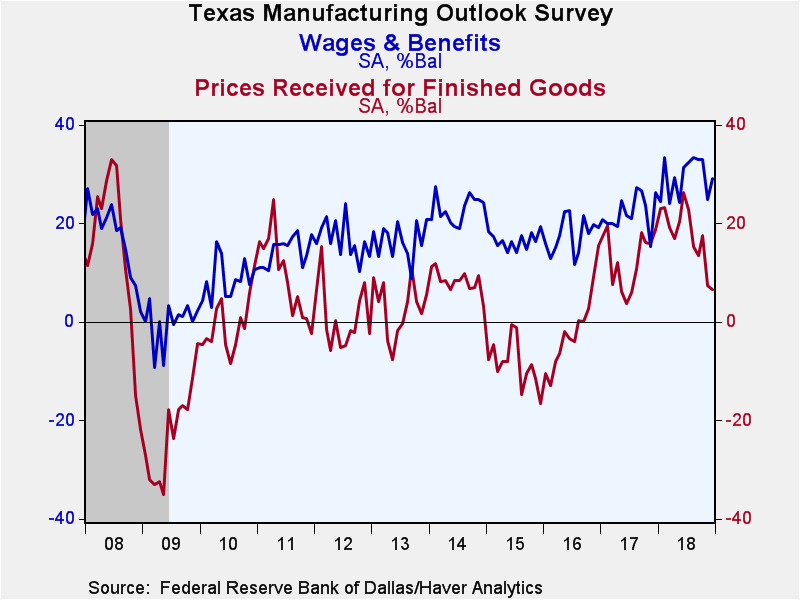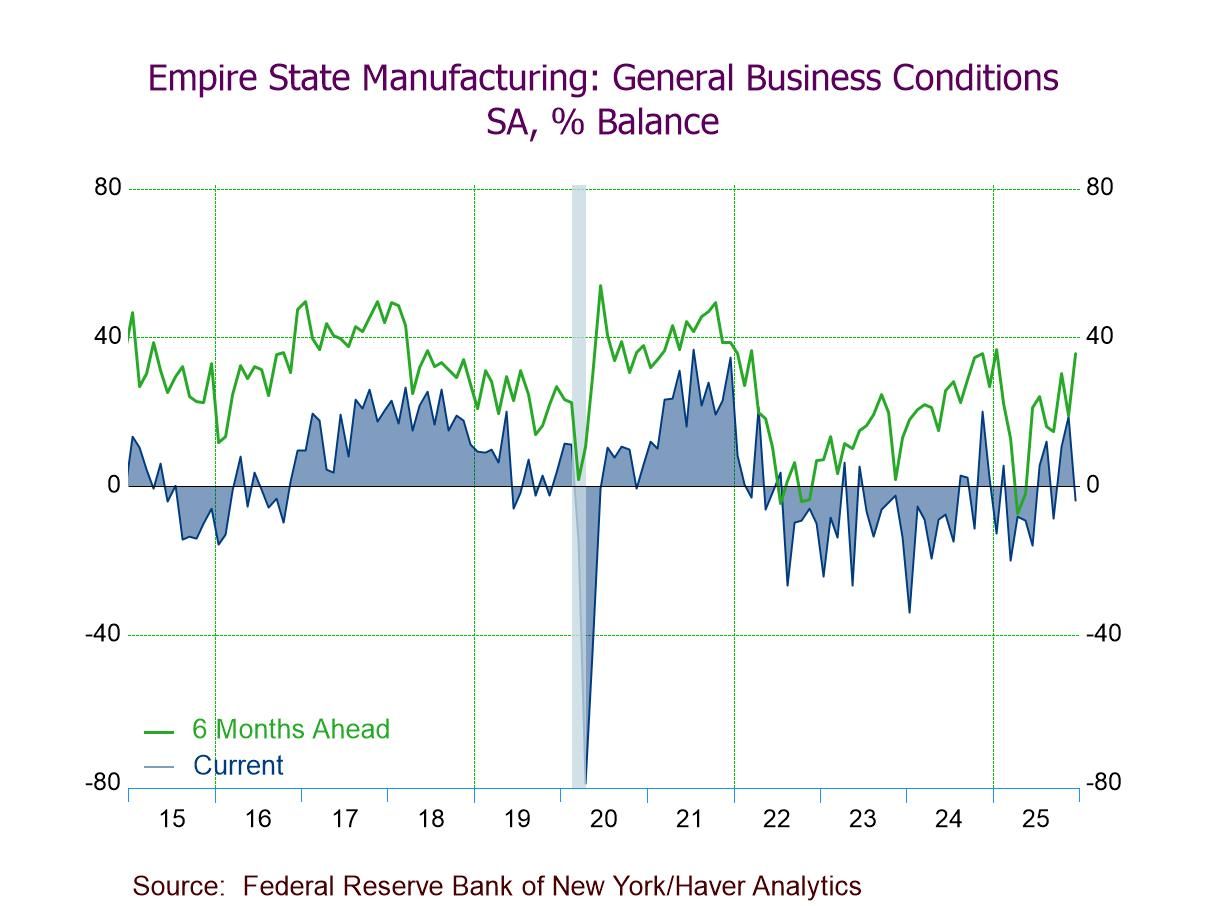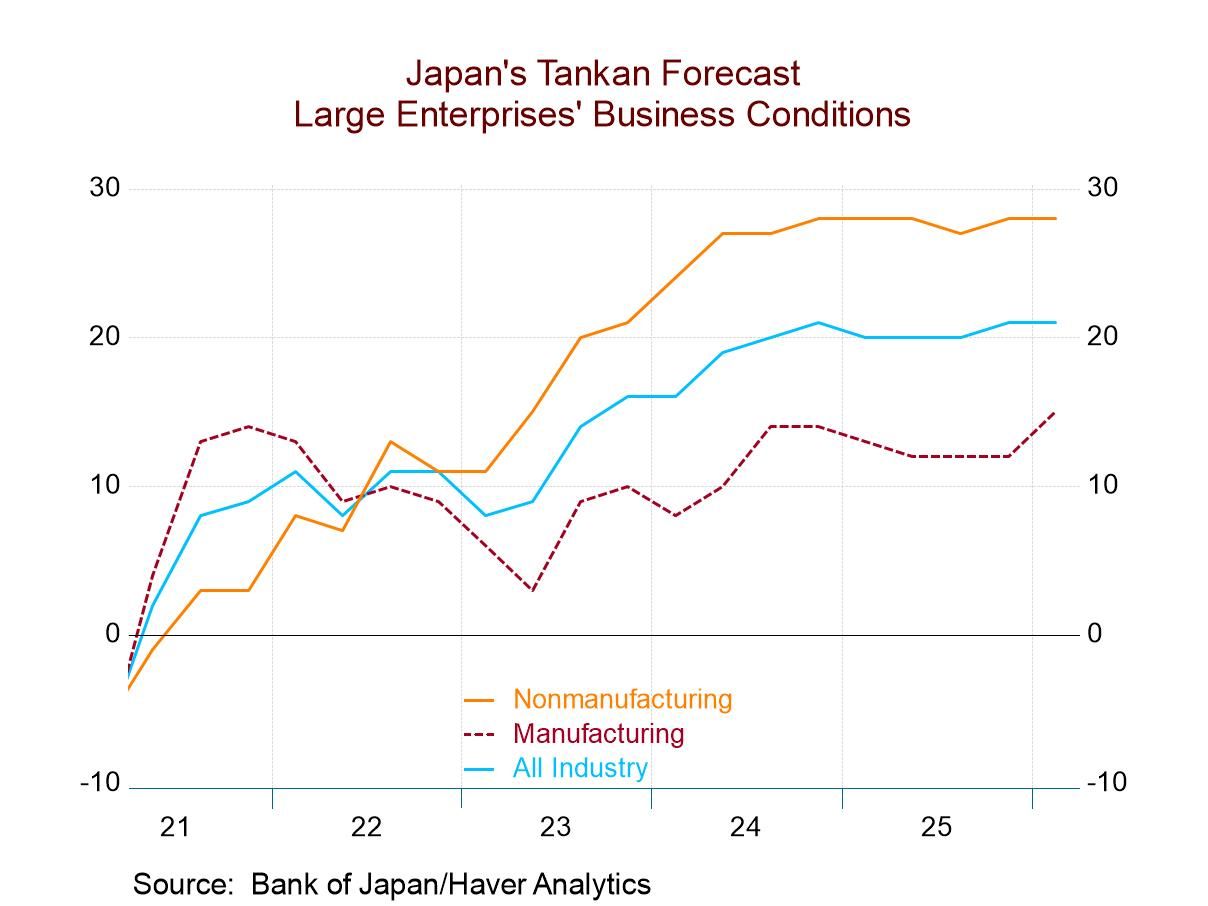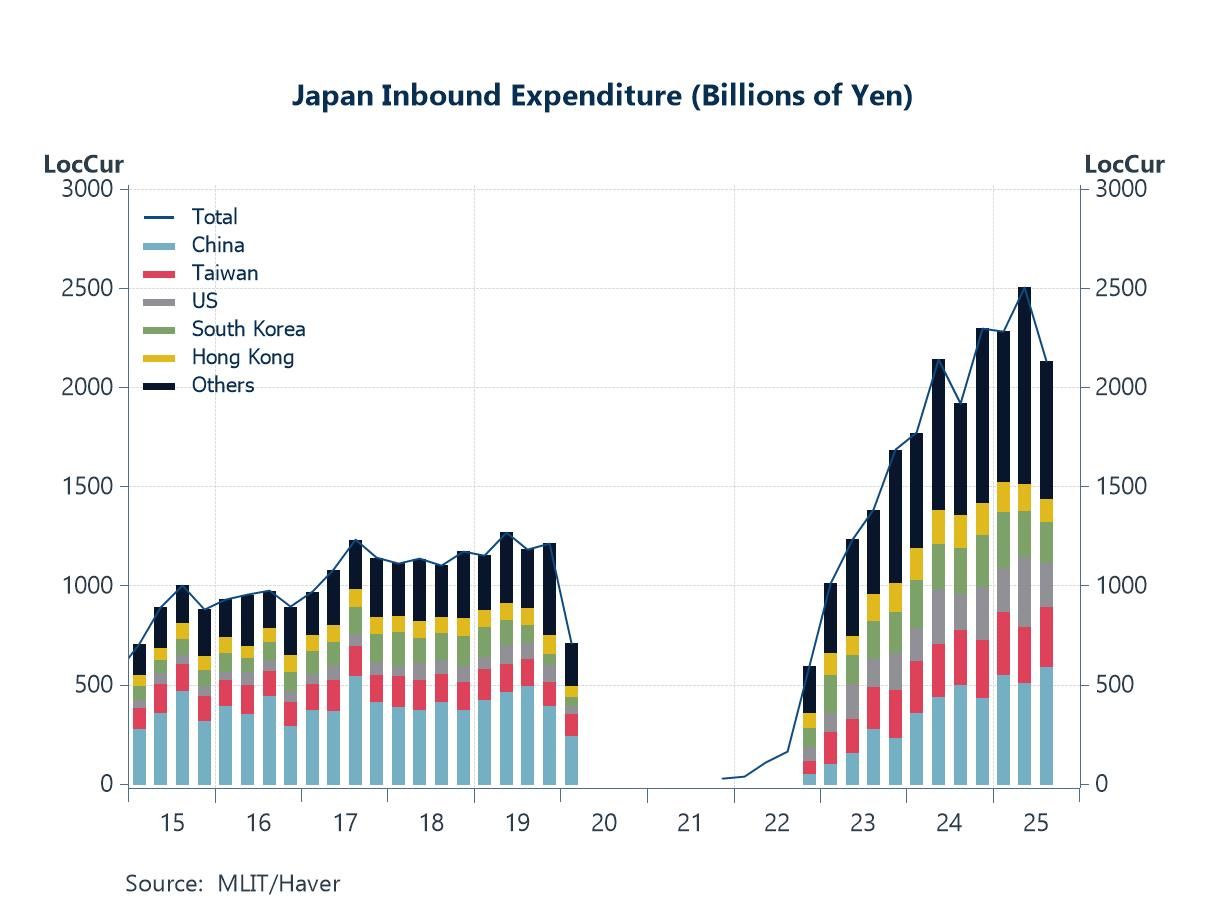 Global| Jan 02 2019
Global| Jan 02 2019Texas Factory Sector Index Plummets; Outlook Worsens
by:Tom Moeller
|in:Economy in Brief
Summary
The Federal Reserve Bank of Dallas reported in its Texas Manufacturing Outlook Survey that the General Business Activity Index declined to -5.1 during December from 17.6 in November. It was the lowest level since June 2016. The index [...]
The Federal Reserve Bank of Dallas reported in its Texas Manufacturing Outlook Survey that the General Business Activity Index declined to -5.1 during December from 17.6 in November. It was the lowest level since June 2016. The index had been easing for six months.
Lower production, shipments and delivery times indexes accounted for the decline, all of which were down sharply versus earlier highs. The employment measure fell to the lowest level since March and was well below its high during August. Hours-worked have been fairly steady for two months but were sharply below the May high. The wages & benefits measure recovered some of its sharp decline during November, and continued the improvement during the last two years.
The index for finished goods prices received declined to the lowest level since July 2017 and was well below its high in June of this year. The raw materials price measure also fell sharply.
The index of expected business conditions in six months also declined significantly to the lowest level since May 2016. Movement amongst the sub-series was mixed. Expected orders, production, shipments and capital spending fell sharply. Expected employment decreased to a two-year low and was off sharply following strength during November. The future wages & benefits reading remained below its 2018 high.
Each index is calculated by subtracting the percentage reporting a decrease from the percentage reporting an increase. When all firms report rising activity, an index will register 100. An index will register -100 when all firms report a decrease. An index will be zero when the number of firms reporting an increase or decrease is equal. Items may not add up to 100% because of rounding. Data for the Texas Manufacturing Outlook can be found in Haver's SURVEYS database.
| Texas Manufacturing Outlook Survey (SA, % Balance) | Dec | Nov | Oct | Dec'17 | 2018 | 2017 | 2016 |
|---|---|---|---|---|---|---|---|
| Current General Business Activity Index | -5.1 | 17.6 | 29.4 | 30.5 | 26.1 | 20.6 | -8.9 |
| Production | 7.3 | 8.4 | 17.6 | 33.8 | 21.8 | 20.2 | 2.4 |
| Growth Rate of New Orders | 5.8 | 4.8 | 11.0 | 23.2 | 14.8 | 11.4 | -7.3 |
| Employment | 11.0 | 15.9 | 23.9 | 21.1 | 19.9 | 11.4 | -4.9 |
| Wages & Benefits | 29.2 | 24.9 | 32.9 | 26.3 | 29.4 | 22.2 | 17.6 |
| Prices Received for Finished Goods | 6.6 | 7.5 | 17.5 | 18.7 | 17.7 | 12.7 | -1.6 |
| General Business Activity Index Expected in Six Months | 3.2 | 25.7 | 35.6 | 40.2 | 32.2 | 34.5 | 8.9 |
| Production | 32.7 | 52.9 | 47.9 | 47.8 | 48.1 | 46.8 | 35.8 |
| Growth Rate of New Orders | 23.1 | 32.1 | 36.5 | 40.1 | 35.7 | 37.7 | 24.3 |
| Employment | 28.2 | 42.0 | 32.8 | 36.6 | 37.8 | 35.2 | 16.8 |
| Wages & Benefits | 45.0 | 44.8 | 51.4 | 43.7 | 50.5 | 43.4 | 34.8 |
Tom Moeller
AuthorMore in Author Profile »Prior to joining Haver Analytics in 2000, Mr. Moeller worked as the Economist at Chancellor Capital Management from 1985 to 1999. There, he developed comprehensive economic forecasts and interpreted economic data for equity and fixed income portfolio managers. Also at Chancellor, Mr. Moeller worked as an equity analyst and was responsible for researching and rating companies in the economically sensitive automobile and housing industries for investment in Chancellor’s equity portfolio. Prior to joining Chancellor, Mr. Moeller was an Economist at Citibank from 1979 to 1984. He also analyzed pricing behavior in the metals industry for the Council on Wage and Price Stability in Washington, D.C. In 1999, Mr. Moeller received the award for most accurate forecast from the Forecasters' Club of New York. From 1990 to 1992 he was President of the New York Association for Business Economists. Mr. Moeller earned an M.B.A. in Finance from Fordham University, where he graduated in 1987. He holds a Bachelor of Arts in Economics from George Washington University.


